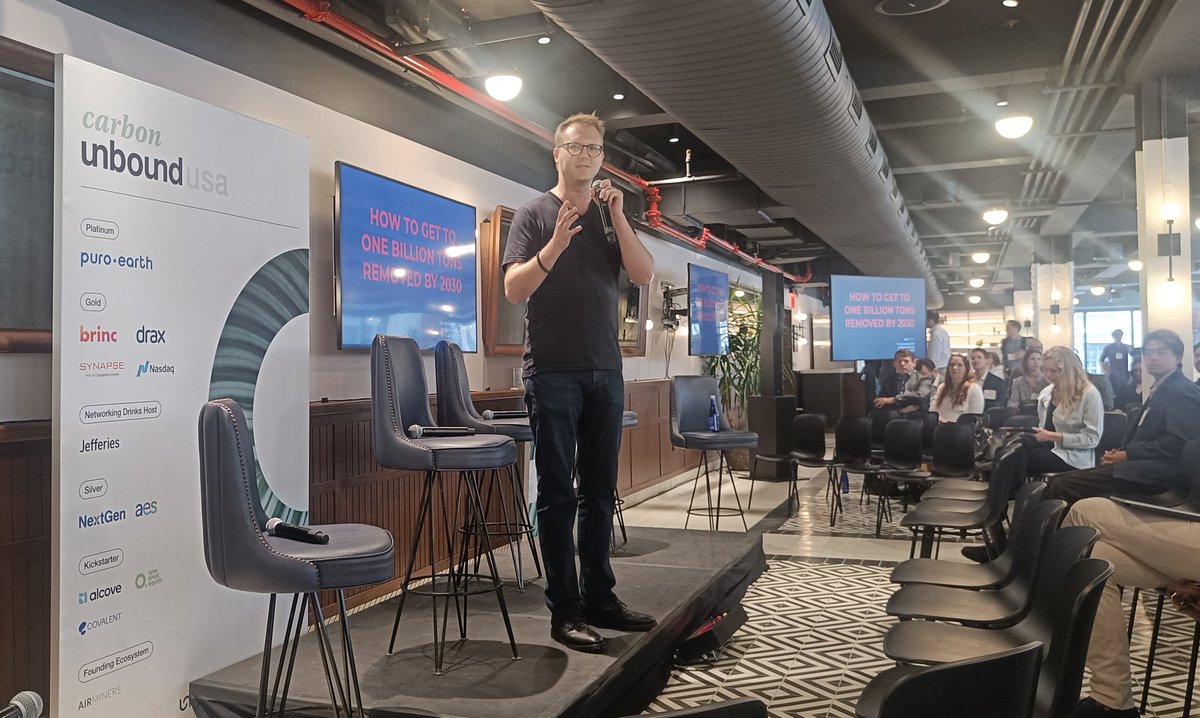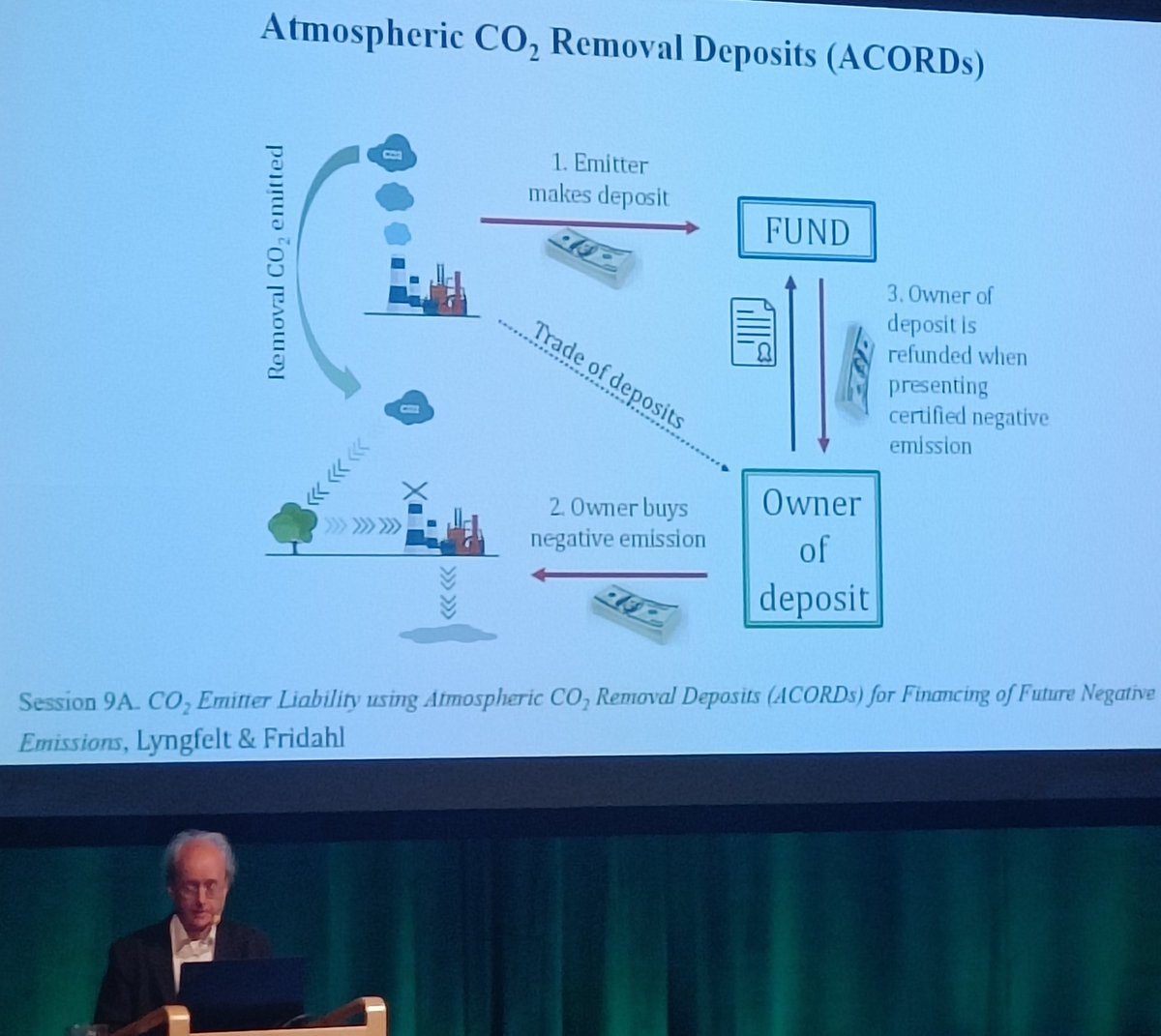Tomorrow #carbonunbound starts. Get ready for a mega-thread.
Noah Deich kicks off by telling us that 10 years ago, all US carbon removal policy there was, were a 250k check to Carbon 180 @TheCarbonSink #carbonunbound
"Who is MRV for?" - Anu Khan Carbon 180
She makes the case that MRV is accountability for creating a just outcome. It's the broader group of stakeholders that benefits from the carbon removal that you are ultimately doing the MRV for. #carbonunbound
She makes the case that MRV is accountability for creating a just outcome. It's the broader group of stakeholders that benefits from the carbon removal that you are ultimately doing the MRV for. #carbonunbound
US DAC companies have a huge advantage, but at 2033 they better be able to deliver at <$200 - Adrian Corless at CarbonCaturen inc
DAC session highlights a lot of issues ahead. Permitting, energy access, takes years just to get a transformer. It's hard to scale.
And those are issues that money doesn't solve.
We need to be very smart about scaling CDR not to get stuck.
We need to be very smart about scaling CDR not to get stuck.
@titojankowski "I was completely convinced that the ONLY way carbon removal could scale to a billion tonne was to make valuable products out of CO2....
.... And I was completely wrong"
#carbonunbound
.... And I was completely wrong"
#carbonunbound

What are investors tripped up about? They are convinced CDR is going to be huge, but not how fast it's going to happen,or how profitable it will be -@titojankowski #carbonunbound
Everest Carbon found buyers by spamming all buyers listed on @cdr_fyi 😅
And Silicate got their first sale by messaging me on LinkedIn 😅
"If you are buying Enhanced weathering credits, make sure they measure bicarbonates in the soil water, soil samples are not enough"
-Maurice Bryson, Silicate
-Maurice Bryson, Silicate

And I talked too! We need to normalize that every company should be financing climate projects. It should be the default expectation. People should be surprised if they hear about a company that's not contributing at all. #carbonunbound 

@carbonfuture_ presented their impressive study on CDR policy in 50 US states! Out on Monday. #carbonunbound 

Savvy Bowman from @ClearPathAction pointed to the need for government procurement to get a broad support for different solutions. Other mechanisms like 45Q are narrow. 

We don't have any concerns about investing in carbon removal other than that others won't. - Andy Bonsall at @wecounteract #carbonunbound
Day 2. Buyers panel now. Clear how NextGen and Frontier take different roles as big CDR buyers. NextGen focused on price and scale, Frontier on kick-starting new technologies, (but with the offtake agreements comes scale too). #carbonunbound
A quality bar is not enough, there is always an opportunity cost, so money should go to the highest quality projects -@joannaklitzke Stripe (freely quoted)
Price is a false-flag. Some companies are selling the same tonnes at very different prices to different buyers. And some are selling at a loss
-@ManaPhilip South Pole
And @joannaklitzke agreeing, it's the long-term *cost* of removal that's important.
-@ManaPhilip South Pole
And @joannaklitzke agreeing, it's the long-term *cost* of removal that's important.
Frontiers offtake agreements will be in the $10-50 million range. They focus a lot on the believability of the cost-curve.
It was asked How deep the market is at different price points?
My question is how could we even know? We keep saying $100/t, but are there any studies trying to look at demand at different price points?
My question is how could we even know? We keep saying $100/t, but are there any studies trying to look at demand at different price points?
Great panel on storage. Underground storage in a class VI well is good and fine if you have a million tonnes but not for a few thousand. Challenging for smaller players. Partnership with concrete companies like @Carbon_Built is a path for the early projects.
Biggest laughter yet came when Paul Needham of Arca told us he asked ChatGPT what to name his pet serpentine rock..
It's now called Serpi McRockface
It's now called Serpi McRockface
Brock from @planetary_tech describes how they tried to do deep community engagement and reached out to everyone, but no one was interested. Then a local newspaper wrote a clickbait article and they got massive resistance. #carbonunbound 

Solar panel manufacturers don't typically run solar power plants. We will see a similar development in CDR with pure infrastructure players buying CDR equipment and removing carbon. Highlighted by Michael Baited from AES.
And.. finally, a wrapup, my eight insights from the conference, which also functions like a snapshot of the industry marginalcarbon.substack.com/p/cautiously-o…
• • •
Missing some Tweet in this thread? You can try to
force a refresh

 Read on Twitter
Read on Twitter




